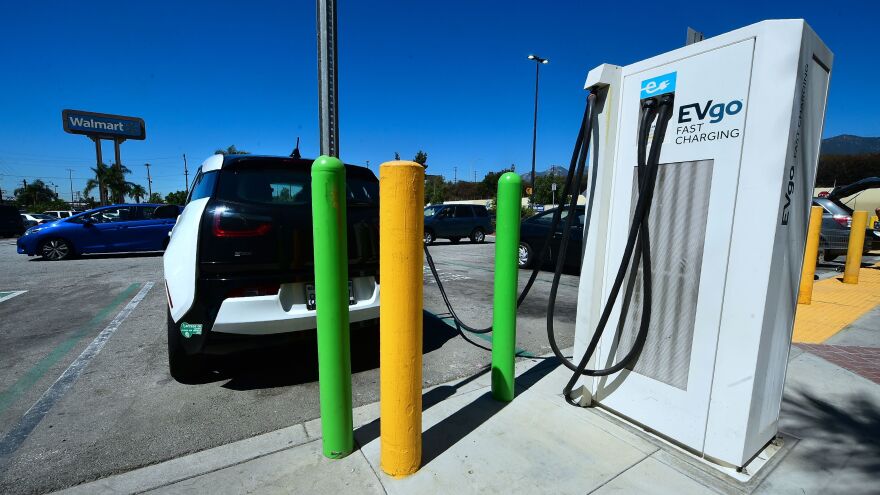The sale of electric vehicles in the U.S. and globally has increased significantly over the past few years. In June, the U.S. market for electric cars reached what many analysts consider a “tipping point” for mass adoption: More than 5% of all vehicle sales are fully electric, and sales are expected to reach an all-time high in 2022.
Under the Inflation Reduction Act signed by President Joe Biden, a federal $7,500 tax credit for buying new electric vehicles has been extended, promising more growth in the electric vehicle market for years to come.
The mass adoption of electric cars is lauded by many climate scientists and activists as being a cornerstone of bringing carbon emissions down to match federal goals. And with gas prices reaching an all-time high earlier this year, it could also help many households save significant money in the long term.
But two years ago, the Florida Department of Agriculture issued a report sounding an alarm about what widespread implementation could mean for a mass evacuation scenario, along the lines of what Florida has seen this week with Hurricane Ian.
Since major hurricanes are often coupled with widespread power outages, the situation could leave electric vehicle drivers “stranded without transportation for days,” the report found.
The report called on the Florida Department of Transportation and the Department of Motor Vehicles to rapidly build up a network of rapid charging stations, along with investing in portable charging stations that can be charged and deployed along major routes to avoid a disaster on top of a disaster.
“One major issue comes from crowding — long queues. I'd expect it to form in gasoline stations and also charging stations,” said University of Illinois researcher Eleftharia Kontou, who co-authored a new study about the issue in South Florida. “What happens with electric vehicles is that charging is more time consuming. So having fast charging infrastructure is very important so that people can quickly charge and go to a shelter during the migrations.”
The lack of rapid charging stations can lead to people fleeing a disaster to take longer and indirect routes to get to storm shelters. That can put them more directly in harm's way, said Kontou.
“We see that a lot of charging infrastructure is currently available in urban centers and close to interstates, so people in rural areas and rural populations might be worse off during these scenarios,” said Kontou. “It's important to care about this population during the deployment of new charging infrastructure and of course, provide information, campaigns and maps for their evacuation.”
The state of Florida has begun rolling out a series of electric vehicle charging stations using $25 million in settlement money from the Volkswagen emissions scandal case. Kontou said the state has not been rolling the stations out “fast enough” but notes positive signs are on the horizon.
Nearly $200 million for expanding the electric vehicle charging network is expected to come over the next five years thanks to the bipartisan infrastructure bill signed by President Biden earlier this year.
Some potential issues are farther down the line, when use of electric vehicles becomes hits a critical mass. A 2020 study by Princeton researchers, based on the evacuations that took place during Hurricane Irma in 2017, found that if half the cars fleeing Miami-Dade, Broward and Palm Beach counties were electric, it could overwhelm and potentially shut down the energy grid when they need to recharge in Central Florida.
This scenario could spur an even larger energy crisis for the entire southeast United States.
“The failure of a local power network may trigger a large-scale collapse of power grids over the entire state of Florida and even threaten the power grids in Georgia and Louisiana,” wrote the researchers. “Thus, the potential risk may be higher in reality.”
The evacuation of Florida residents during Hurricane Irma was one of the largest evacuations in U.S. history, it should be noted. Not every storm will look like that.
Nevertheless, Kontou stressed the importance of preparing the energy grid for “peak demand” we might expect during evacuations.
“We're going to see a lot of people needing to recharge at the very same time,” said Kontou. “It's important to plan and have the appropriate expansions of the electrical grid concurrently as we see more adoption of electric vehicles in order to facilitate both electrification during day to day and also during emergencies.”
The Princeton study concluded that due to all these issues, a wholesale adaptation of electric vehicles is not recommended for disaster-prone areas like Florida. It “may not be economical” for utility companies to prepare for these rare disaster scenarios and the peak demand it would entail, they found. As a result, the Princeton researchers concluded that hybrid vehicles could be a happy medium of helping reach climate goals while keeping Floridians safe during a disaster. Or for a family with two vehicles, it might make sense to keep at least one non-electric vehicle (or a hybrid), even once electric vehicles reach critical mass in the future.
“It might be a good idea for emergency planners and evacuation coordinators to collaborate closely with charging infrastructure providers and utilities and identify these locations that are critical for charging during evacuations and prioritize them so that they can make sure that they are operational, that they have enough ports so that they can facilitate people charging there,” said Kontou.




